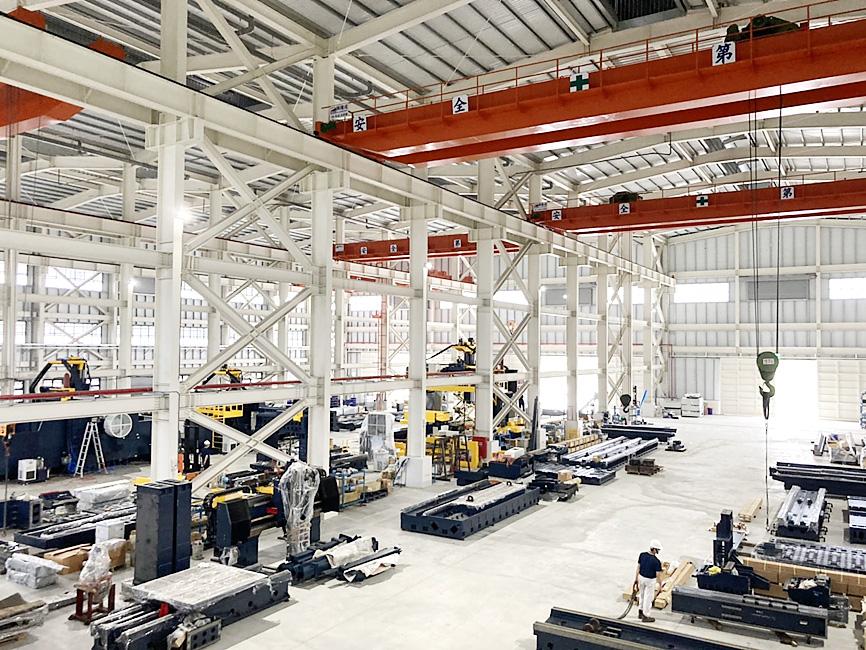The official manufacturing purchasing managers’ index (PMI) last month was 62.7, soundly in the expansion zone for the ninth straight month, with all sectors reporting an uptick in business amid deepening concern over inflation risks, the Chunghua Institution for Economic Research (CIER, 中華經濟研究院) said yesterday.
The economic barometer has been above 60 for five months in a row, although it has slowed from a peak in January, CIER president Chang Chuang-chang (張傳章) said, calling attention to a record 91.6 reading for raw-material prices that makes inflation a serious issue.
“Prices for oil, raw materials and mass commodities are spiking, and producers might soon pass costs on to consumers,” Chang said.

Photo: Yen Hung-chun, Taipei Times
PMI data aim to capture the health of the manufacturing industry, with scores under 50 indicating contraction and values above the neutral threshold signaling expansion.
Policymakers must not take the price hikes lightly, but should map out responses, Chang said.
Supply Management Institute in Taiwan (中華採購與供應管理協會) executive director Steve Lai (賴樹鑫) said that producers are generally absorbing price hikes, but that would not last long.
Money-printing by major central banks to mitigate the pain of the COVID-19 pandemic is fueling inflation and expectations of a global economic recovery is lending support.
The government’s business climate monitor in February flashed “red” for the first time in a decade, indicating that the nation’s economy is booming and might overheat if the boom extends into the second half of this year, National Development Council Minister Kung Ming-hsin (龔明鑫) said last month.
The central bank has said that it would not raise interest rates ahead of global peers to prevent hot money from destabilizing the local currency.
The PMI subindex on new business orders was 60.5, while the industrial production gauge was 59.2, CIER’s monthly survey found.
The measure on delivery time gained 1.4 points to 74.7, the fastest rise in history as shipping delays and container shortages added difficulty, Chang said.
The gauge on inventory rose to 59.9, but customer inventory remained weak at 45.2, the survey showed.
Firms slightly increased headcounts to help digest demand.
Companies in all sectors have rosy expectations, sending the six-month outlook reading to an all-time high of 78.8, Chang said.
The non-manufacturing index rose 3.1 points to 55.2, as service-oriented sectors — excluding wholesale firms, restaurants and hotels — shared the benefit of a booming economy, the CIER said in a separate report.
An upturn in the next six months is likely in the non-manufacturing sectors, including hospitality providers, it said.

TECH BOOST: New TSMC wafer fabs in Arizona are to dramatically improve US advanced chip production, a report by market research firm TrendForce said With Taiwan Semiconductor Manufacturing Co (TSMC, 台積電) pouring large funds into Arizona, the US is expected to see an improvement in its status to become the second-largest maker of advanced semiconductors in 2027, Taipei-based market researcher TrendForce Corp (集邦科技) said in a report last week. TrendForce estimates the US would account for a 21 percent share in the global advanced integrated circuit (IC) production market by 2027, sharply up from the current 9 percent, as TSMC is investing US$65 billion to build three wafer fabs in Arizona, the report said. TrendForce defined the advanced chipmaking processes as the 7-nanometer process or more

China’s Huawei Technologies Co (華為) plans to start mass-producing its most advanced artificial intelligence (AI) chip in the first quarter of next year, even as it struggles to make enough chips due to US restrictions, two people familiar with the matter said. The telecoms conglomerate has sent samples of the Ascend 910C — its newest chip, meant to rival those made by US chipmaker Nvidia Corp — to some technology firms and started taking orders, the sources told Reuters. The 910C is being made by top Chinese contract chipmaker Semiconductor Manufacturing International Corp (SMIC, 中芯) on its N+2 process, but a lack

NVIDIA PLATFORM: Hon Hai’s Mexican facility is to begin production early next year and a Taiwan site is to enter production next month, Nvidia wrote on its blog Hon Hai Precision Industry Co (鴻海精密), the world’s biggest electronics manufacturer, yesterday said it is expanding production capacity of artificial intelligence (AI) servers based on Nvidia Corp’s Blackwell chips in Taiwan, the US and Mexico to cope with rising demand. Hon Hai’s new AI-enabled factories are to use Nvidia’s Omnivores platform to create 3D digital twins to plan and simulate automated production lines at a factory in Hsinchu, the company said in a statement. Nvidia’s Omnivores platform is for developing industrial AI simulation applications and helps bring facilities online faster. Hon Hai’s Mexican facility is to begin production early next year and the

Who would not want a social media audience that grows without new content? During the three years she paused production of her short do-it-yourself (DIY) farmer’s lifestyle videos, Chinese vlogger Li Ziqi (李子柒), 34, has seen her YouTube subscribers increase to 20.2 million from about 14 million. While YouTube is banned in China, her fan base there — although not the size of YouTube’s MrBeast, who has 330 million subscribers — is close to 100 million across the country’s social media platforms Douyin (抖音), Sina Weibo (新浪微博) and Xiaohongshu (小紅書). When Li finally released new videos last week — ending what has